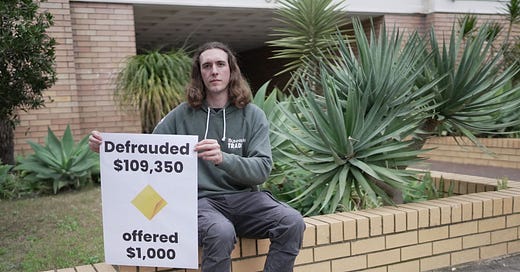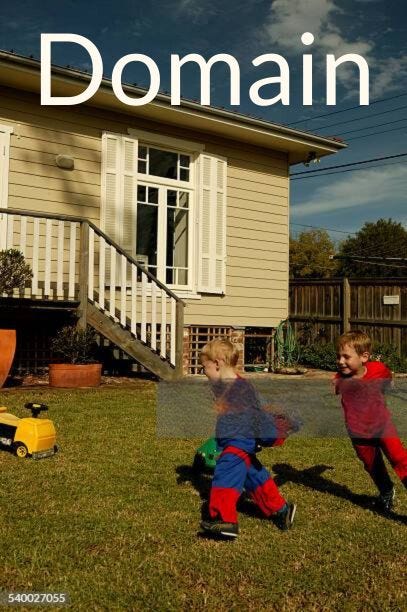Australian banks do not protect your money
How this mama bear turned all Erin Brockovich over her son's experience buying a home
Did you know young people are more likely to be scammed than older people?
Me either. Until my 23-year-old son joined the hundreds of thousands of Australian people who have been scammed.
These homebuyer cyber frauds have been reported in Australia since at least 2018, when a Masterchef contestant lost a quarter of a million dollars in a PEXA fraud.
They are happening in larger and larger numbers - you can read the story I wrote for Sydney Morning Herald last year and maybe listen to this or this. While Australian scam reports did fall between 2023 and 2024, these types of payment misdirection frauds actually rose by 66%. And Artificial Intelligence is making it a cinch.
I have been firmly shaken from my middle-aged slumber about the great Australian housing dream (and how much profits Australian banks make from the $3.3 trillion we all hold in mortgages).
The reality is, Australia is being targeted by international and transnational crime gangs for our housing wealth.
A Western Australian woman lost $732,000 buying a house plus WA victims have experienced another $503,000 in losses reported in this story.
Conveyancers Institute of SA has independently confirmed to me there was a $500,000 homebuyer loss in 2023.
Slater+Gordon have confirmed the $500,000 loss of a Melbourne homebuyer.
And now my son and at least eight other home buyers I have spoken with personally have joined the list.
My son was scammed into transferring funds when buying his first property, making two transfers to Property Exchange Australia (PEXA) that went to an ANZ bank account instead of the Westpac accounts PEXA actually use.
Neither CommBank or ANZ will refund the payment (despite notifying them within two business days of the crime), insisting Louis ‘authorised the transaction’ - the Australian law believes Louis wished that six-figure financial loss upon himself.
Even more crazily, the Australian Financial Complaints Authority say it’s perfectly fine for CommBank to charge interest on the money they allowed him to use. “It’s just the same as if he gambled the money,” the AFCA ombudsman said to me. No word of a lie.
Only I don’t think buying a house should be a gamble.
I have spent countless hours trying to untangle how Australian banks are allowing fraudsters and crims set up shop and perpetrate scams - it’s disgusting what I have uncovered. Mule accounts are absolutely rife, with Australians renting their bank accounts for scams on Facebook.
I have confirmed that the two homebuyers I interviewed for Sydney Morning Herald had money stolen by NAB and CommBank bank accounts that had been set up with stolen or forged identity documents.
In Louis’ case, the ANZ bank enabled the crime against him - and the banks refuse to disclose who the ‘real’ account holder is, only saying it was NOT in fact PEXA while also saying ‘too bad, so sad’ - all the money is now gone from that account and they only recover it on a ‘best endeavours’ basis. Thankfully, Victorian Police have arrested this person.
While most of us endure the endless 100 points of identity check to set up a bank account (try doing THAT when you’ve changed your surname after a divorce - sheesh!), crims are able to use fraudulent documents and then steal money through social engineering scams raking in billions.
Why be a drug dealer or a bank robber when you can scam through Australian banks? So much easier …
Spear phishing is real: large transactions make you a target
I was proud when my 23-year-old son saved hard to buy that very rare thing: a Sydney apartment that cost less than $400,000.
Like many people who earned more from housing wealth than any wage rises our bosses handed out, I wanted my children to get on the property ladder, even if it my son had to live in a ‘renovators delight’.
There’s no better way to create financial security over time than to pay off your own home to live in – why battle ever-rising rents when you can pay a little more to pay down a mortgage over 30 years and eventually own it outright?
When my kids were young, I wrote about property for a living to pay my own hideously large mortgage (and indulge my kids’ passion for polyester superhero suits and Tonka trucks). They even made the cover of Domain as toddlers. So cute, right?
I wrote books about stress busting your mortgage and planning perfect renovations. I also wrote a blog for the newspaper called Renovation Nation (A blog! Remember them?). I blindly taught my kids that the Australian property dream is something to strive for. Now I’m not so sure
If the head shakingly large house deposits and mortgages don’t break them, the way banks treat them might.
For people under the age of 30, bearing losses of between $50,000 and $100,000 compounds into a loss of between $300,000 and $600,000 by the time they are aged 67.
If Louis could have put that $109,650 into superannuation, instead of a scammers’ account, he would have an obscenely large $2.8 million nest egg. (Compound interest really is amazing.)
Generational inequality: too bad
I can’t help but realise the property blessings that my generation experienced don’t afford anywhere near the same opportunities for financial security that young people face now.
Australia has the second most expensive property in the world (only Hong Kong is more expensive), making Australian property an attractive market for international criminals to ply their scams.
The banks, who profit from the interest payments on ever-higher mortgages, force customers to bear the risk of living in this increasingly complex digital-first world that lets criminals hijack legitimate bank accounts for illicit means.
This has financial costs and mental health costs, with Cybertrace CEO Dan Halpin - ex ASIO and NSW Police - saying he knows that suicides and depression are a part of this story.
Even the word ‘scam’ implies only gullible people fall for technology tricksters, when cyber fraud is an increasingly sophisticated major financial crime stealing $5210 every minute from Australia’s economy, based on the $2.74 billion in fraud losses reported to Scamwatch in 2022-23.
Independent economist Saul Eslake says Australia’s scam losses in 2023 were just point one percentage point of our $2.7 trillion economy, which isn’t large today but will become larger the longer scammers get away with shovelling the money offshore.
“Learning not to click on links or open email attachments needs to become as ingrained as wiping your bottom after going to the toilet,” he says.
Meanwhile, banks write letters to financial crime victims that say: “The legal standard required of banks to be diligent and prudent does not place them under an obligation to check the validity of transactions (or) maintain watching briefs for scams for their customers' benefits.”
Why do we pay banks fees and interest if they can’t keep money safe from criminals?
The real crime is not only robbing young people of money, it’s robbing them of trust in banks and governments to protect them while striving to get on the first rung of the property ladder.








This is devastating! Poor Louis. I imagine he's been saving for years while his mates go out and travel. Heart breaking for all of you. Thank you for pointing out this can happen!